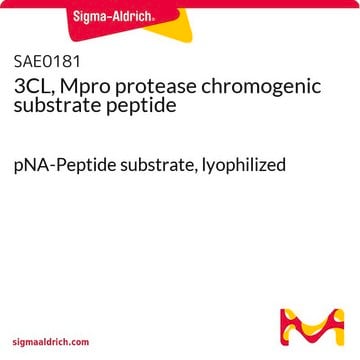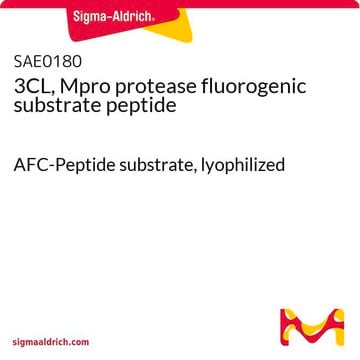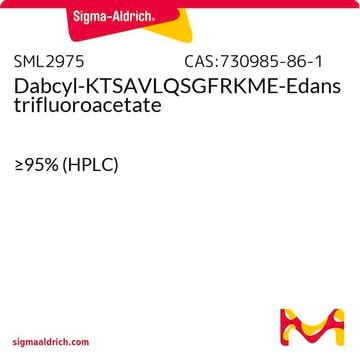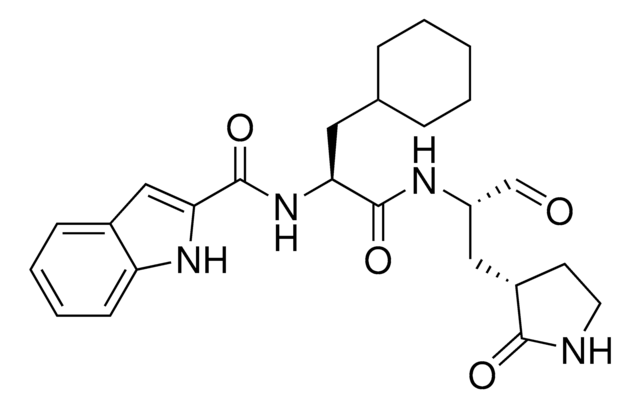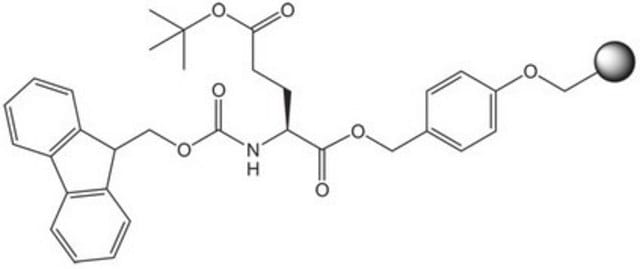Fontos dokumentumok
SAE0172
Mpro, 3CL Protease from coronavirus SARS-COV-2
recombinant protein, lyophilized product
Szinonimák:
2019-nCoV, 3C Like proteinase, 3C-like main protease, 3CL Mpro, 3CL protease, 3CL proteinase, 3CLpro, COVID-19, COVID-2019, SARS-CoV-2, coronavirus
About This Item
Javasolt termékek
Minőségi szint
form
lyophilized
NCBI elérési szám
kiszállítva
wet ice
tárolási hőmérséklet
−20°C
Általános leírás
- Mpro (main protease)
- PLpro (Papain-like protease)
SARS-CoV Mpro, 3CL exists as a homodimer and each protomer has an active site. The proteolytic cleavage of 1ab polyprotein by Mpro occurs at 11 sites: 7 sites within the 1a polyprotein, and 11 sites within the 1ab polyprotein. This results in maturation of 16 viral non-structural proteins.Mpro protease forms a functional homodimer. Both the N-terminus and the C- terminus of Mpro have been shown to be critical for dimer formation and for enzyme function.
The Mpro protease, 3CLpro is an ideal target for antiviral drug design due to its high conservation between different coronavirus strains and absence of functional analogs in the human proteome. Mpro protease from SARS-CoV1 and SARS-CoV2 are functionally identical.
Tulajdonságok és előnyök
Fizikai forma
The product is supplied lyophilized from 20 mM HEPES, 2.5% Trehalose, and 0.05% Tween 20
Figyelmeztetés
Danger
Figyelmeztető mondatok
Óvintézkedésre vonatkozó mondatok
Veszélyességi osztályok
Resp. Sens. 1
Tárolási osztály kódja
11 - Combustible Solids
WGK
WGK 3
Analitikai tanúsítványok (COA)
Analitikai tanúsítványok (COA) keresése a termék sarzs-/tételszámának megadásával. A sarzs- és tételszámok a termék címkéjén találhatók, a „Lot” vagy „Batch” szavak után.
Már rendelkezik ezzel a termékkel?
Az Ön által nemrégiben megvásárolt termékekre vonatkozó dokumentumokat a Dokumentumtárban találja.
Tudóscsoportunk valamennyi kutatási területen rendelkezik tapasztalattal, beleértve az élettudományt, az anyagtudományt, a kémiai szintézist, a kromatográfiát, az analitikát és még sok más területet.
Lépjen kapcsolatba a szaktanácsadással